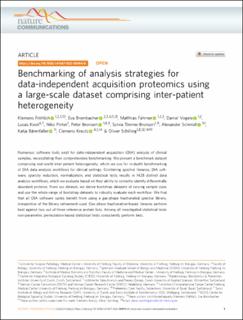Please use this identifier to cite or link to this item:
https://doi.org/10.21256/zhaw-31214Full metadata record
| DC Field | Value | Language |
|---|---|---|
| dc.contributor.author | Fröhlich, Klemens | - |
| dc.contributor.author | Brombacher, Eva | - |
| dc.contributor.author | Fahrner, Matthias | - |
| dc.contributor.author | Vogele, Daniel | - |
| dc.contributor.author | Kook, Lucas | - |
| dc.contributor.author | Pinter, Niko | - |
| dc.contributor.author | Bronsert, Peter | - |
| dc.contributor.author | Timme-Bronsert, Sylvia | - |
| dc.contributor.author | Schmidt, Alexander | - |
| dc.contributor.author | Bärenfaller, Katja | - |
| dc.contributor.author | Kreutz, Clemens | - |
| dc.contributor.author | Schilling, Oliver | - |
| dc.date.accessioned | 2024-08-02T07:29:22Z | - |
| dc.date.available | 2024-08-02T07:29:22Z | - |
| dc.date.issued | 2022-05-12 | - |
| dc.identifier.issn | 2041-1723 | de_CH |
| dc.identifier.uri | https://digitalcollection.zhaw.ch/handle/11475/31214 | - |
| dc.description.abstract | Numerous software tools exist for data-independent acquisition (DIA) analysis of clinical samples, necessitating their comprehensive benchmarking. We present a benchmark dataset comprising real-world inter-patient heterogeneity, which we use for in-depth benchmarking of DIA data analysis workflows for clinical settings. Combining spectral libraries, DIA software, sparsity reduction, normalization, and statistical tests results in 1428 distinct data analysis workflows, which we evaluate based on their ability to correctly identify differentially abundant proteins. From our dataset, we derive bootstrap datasets of varying sample sizes and use the whole range of bootstrap datasets to robustly evaluate each workflow. We find that all DIA software suites benefit from using a gas-phase fractionated spectral library, irrespective of the library refinement used. Gas-phase fractionation-based libraries perform best against two out of three reference protein lists. Among all investigated statistical tests non-parametric permutation-based statistical tests consistently perform best. | de_CH |
| dc.language.iso | en | de_CH |
| dc.publisher | Nature Publishing Group | de_CH |
| dc.relation.ispartof | Nature Communications | de_CH |
| dc.rights | https://creativecommons.org/licenses/by/4.0/ | de_CH |
| dc.subject | Human | de_CH |
| dc.subject | Proteome | de_CH |
| dc.subject | Software | de_CH |
| dc.subject | Workflow | de_CH |
| dc.subject | Benchmarking | de_CH |
| dc.subject | Proteomics | de_CH |
| dc.subject.ddc | 005: Computerprogrammierung, Programme und Daten | de_CH |
| dc.title | Benchmarking of analysis strategies for data-independent acquisition proteomics using a large-scale dataset comprising inter-patient heterogeneity | de_CH |
| dc.type | Beitrag in wissenschaftlicher Zeitschrift | de_CH |
| dcterms.type | Text | de_CH |
| zhaw.departement | School of Engineering | de_CH |
| zhaw.organisationalunit | Institut für Datenanalyse und Prozessdesign (IDP) | de_CH |
| dc.identifier.doi | 10.1038/s41467-022-30094-0 | de_CH |
| dc.identifier.doi | 10.21256/zhaw-31214 | - |
| dc.identifier.pmid | 35551187 | de_CH |
| zhaw.funding.eu | No | de_CH |
| zhaw.issue | 1 | de_CH |
| zhaw.originated.zhaw | Yes | de_CH |
| zhaw.pages.start | 2622 | de_CH |
| zhaw.publication.status | publishedVersion | de_CH |
| zhaw.volume | 13 | de_CH |
| zhaw.publication.review | Open peer review | de_CH |
| zhaw.author.additional | No | de_CH |
| zhaw.display.portrait | Yes | de_CH |
| Appears in collections: | Publikationen School of Engineering | |
Files in This Item:
| File | Description | Size | Format | |
|---|---|---|---|---|
| 2022_Frohlich-etal_Analysis-strategies-for-data-independent-acquisition-proteomics.pdf | 2.14 MB | Adobe PDF |  View/Open |
Show simple item record
Fröhlich, K., Brombacher, E., Fahrner, M., Vogele, D., Kook, L., Pinter, N., Bronsert, P., Timme-Bronsert, S., Schmidt, A., Bärenfaller, K., Kreutz, C., & Schilling, O. (2022). Benchmarking of analysis strategies for data-independent acquisition proteomics using a large-scale dataset comprising inter-patient heterogeneity. Nature Communications, 13(1), 2622. https://doi.org/10.1038/s41467-022-30094-0
Fröhlich, K. et al. (2022) ‘Benchmarking of analysis strategies for data-independent acquisition proteomics using a large-scale dataset comprising inter-patient heterogeneity’, Nature Communications, 13(1), p. 2622. Available at: https://doi.org/10.1038/s41467-022-30094-0.
K. Fröhlich et al., “Benchmarking of analysis strategies for data-independent acquisition proteomics using a large-scale dataset comprising inter-patient heterogeneity,” Nature Communications, vol. 13, no. 1, p. 2622, May 2022, doi: 10.1038/s41467-022-30094-0.
FRÖHLICH, Klemens, Eva BROMBACHER, Matthias FAHRNER, Daniel VOGELE, Lucas KOOK, Niko PINTER, Peter BRONSERT, Sylvia TIMME-BRONSERT, Alexander SCHMIDT, Katja BÄRENFALLER, Clemens KREUTZ und Oliver SCHILLING, 2022. Benchmarking of analysis strategies for data-independent acquisition proteomics using a large-scale dataset comprising inter-patient heterogeneity. Nature Communications. 12 Mai 2022. Bd. 13, Nr. 1, S. 2622. DOI 10.1038/s41467-022-30094-0
Fröhlich, Klemens, Eva Brombacher, Matthias Fahrner, Daniel Vogele, Lucas Kook, Niko Pinter, Peter Bronsert, et al. 2022. “Benchmarking of Analysis Strategies for Data-Independent Acquisition Proteomics Using a Large-Scale Dataset Comprising Inter-Patient Heterogeneity.” Nature Communications 13 (1): 2622. https://doi.org/10.1038/s41467-022-30094-0.
Fröhlich, Klemens, et al. “Benchmarking of Analysis Strategies for Data-Independent Acquisition Proteomics Using a Large-Scale Dataset Comprising Inter-Patient Heterogeneity.” Nature Communications, vol. 13, no. 1, May 2022, p. 2622, https://doi.org/10.1038/s41467-022-30094-0.
Items in DSpace are protected by copyright, with all rights reserved, unless otherwise indicated.